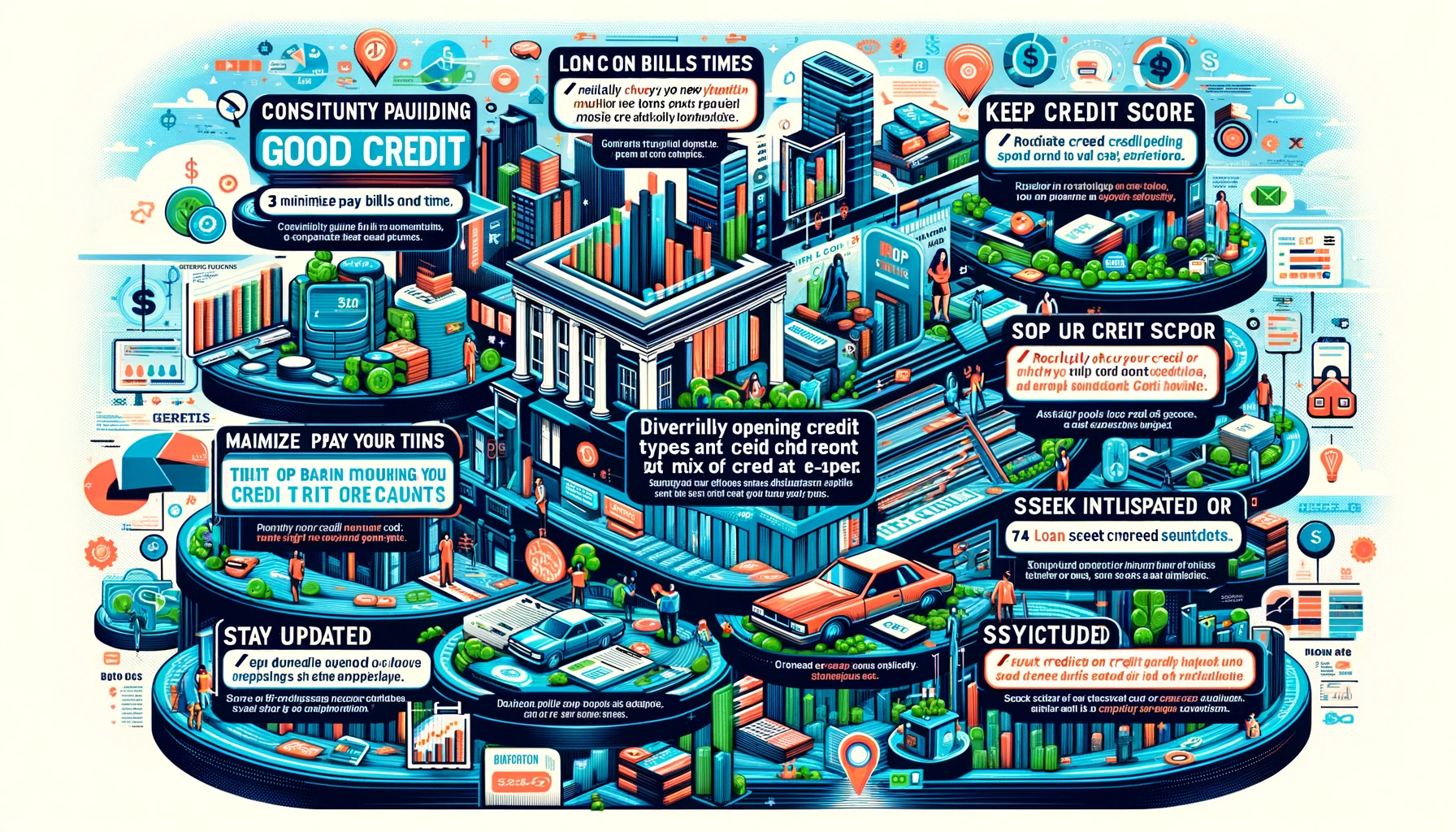Are you ready to take control of your financial future? Your credit score plays a crucial role in shaping your financial well-being. Understanding how it works and knowing where you stand is the first step towards building a solid foundation for a brighter tomorrow. In this blog post, we’ll explore five easy ways to improve your credit score after checking it. Let’s dive in and unlock the secrets to boosting your credit health!
Understanding Your Credit Score
What is a credit score? It’s a three-digit number that reflects your creditworthiness, ranging from 300 to 850. This score helps lenders assess the risk of lending you money. FICO Score and VantageScore are the two main scoring models used by creditors. While both evaluate your creditworthiness, they may use slightly different algorithms.
Several factors impact your credit score, including payment history, amounts owed, length of credit history, new credit accounts, and types of credit used. Understanding these components can help you make informed decisions to improve your score over time.
Checking your credit score regularly allows you to track changes and detect any errors or fraudulent activity promptly. Being aware of where you stand financially empowers you to take proactive steps towards enhancing your financial health.
What is a credit score?
Have you ever wondered what exactly a credit score is and why it holds so much importance in your financial life? Simply put, a credit score is a three-digit number that represents your creditworthiness based on your credit history. It serves as a numerical snapshot of how likely you are to repay borrowed money.
Credit scores typically range from 300 to 850, with higher scores indicating lower risk for lenders and better borrowing terms for you. The most commonly used scoring models are FICO Score and VantageScore, each calculated slightly differently but serving the same purpose.
Essentially, your credit score acts as a report card for your financial behavior. It takes into account factors like payment history, amounts owed, length of credit history, new credit accounts opened, and types of credits used. Understanding this number is crucial in managing your finances effectively and achieving your goals.
FICO Score vs. VantageScore
Understanding the differences between FICO Score and VantageScore can help you grasp how your credit score is calculated. FICO Score, developed by Fair Isaac Corporation, is widely used by lenders to assess credit risk. It ranges from 300 to 850 and considers payment history, amounts owed, length of credit history, new credit, and types of credit used.
On the other hand, VantageScore was created collaboratively by the three major credit bureaus – Equifax, Experian, and TransUnion. It also ranges from 300 to 850 but may weigh certain factors differently than FICO Score. While both scoring models aim to predict a consumer’s likelihood of repaying debt on time, they may produce slightly different scores due to variations in algorithms.
It’s essential to understand which model your potential lender uses when evaluating your creditworthiness as it can impact loan approval and interest rates offered.
What impacts your credit score?
Your credit score is influenced by various factors, all playing a role in determining your overall financial health. One significant factor is payment history. Consistently making on-time payments demonstrates reliability to creditors and can positively impact your score.
Credit utilization ratio is another crucial element that affects your credit score. This ratio reflects the amount of available credit you are using; keeping this percentage low can boost your score.
The length of your credit history also plays a part in determining your creditworthiness. Having a longer credit history shows lenders how well you manage debt over time.
Additionally, the types of accounts you have, such as loans or credit cards, contribute to shaping your credit profile. Mixes of different account types can demonstrate responsible borrowing behavior.
New inquiries and opening multiple accounts within a short period can potentially lower your score as it may indicate financial distress or increased risk for lenders.
Importance of Checking Your Credit Score
Understanding the importance of checking your credit score is crucial for maintaining financial health. Your credit score is a reflection of your financial responsibility and impacts your ability to secure loans, mortgages, and even rent an apartment. By regularly monitoring your credit score, you can catch any errors or fraudulent activity early on.
Checking your credit score allows you to track changes over time and identify areas for improvement. It also gives you insight into how lenders view your creditworthiness, empowering you to take proactive steps to boost your score if needed. Additionally, staying informed about your credit standing puts you in control of your financial future.
Whether you’re working towards buying a home or simply want better interest rates on loans, keeping tabs on your credit score is essential. Take charge of this aspect of your finances by making it a habit to check in regularly with reputable sources like Credit Karma or AnnualCreditReport.com.
Why check your credit score?
Why check your credit score? Checking your credit score is like getting a health check-up for your finances. It provides valuable insights into your financial well-being and allows you to track your progress towards better credit health.
By regularly monitoring your credit score, you can catch any errors or fraudulent activity early on, preventing potential damage to your financial reputation. Additionally, knowing where you stand financially empowers you to make informed decisions when it comes to borrowing money or making significant purchases.
Your credit score influences many aspects of your life, from the interest rates you qualify for on loans and credit cards to even potential job opportunities. A good credit score opens doors to better financial options and savings in the long run.
Checking your credit score regularly gives you the knowledge and control needed to improve and maintain a healthy financial future. It’s a proactive step towards securing better financial stability and achieving your goals.
Ways to Improve Your Credit Score
Improving your credit score is essential for securing better financial opportunities. One way to boost your score is by paying bills on time, as late payments can negatively impact it. Setting up automatic payments or reminders can help you stay on track.
Another effective strategy is reducing your overall debt. Aim to keep your credit card balances low and avoid maxing them out. A good rule of thumb is to use less than 30% of your available credit at any given time.
Additionally, consider diversifying your credit mix by having a healthy combination of different types of accounts. This shows lenders that you can manage various forms of credit responsibly.
Regularly checking your credit report for errors and disputing any inaccuracies can also help improve your score over time. Monitoring for identity theft and fraudulent activity is crucial in maintaining a healthy credit profile.
Be patient and consistent with these efforts as positive changes to your credit score typically take time to reflect positively on your report.
How you can improve your credit score
Improving your credit score is essential for a healthy financial future. One way to boost your score is by making payments on time. Late payments can negatively impact your credit, so setting up reminders or automatic payments can help you stay on track.
Another effective strategy is to pay down existing debt. High balances relative to your credit limits can hurt your score, so working towards lowering those balances can make a significant difference. Additionally, avoid opening multiple new accounts at once as this could signal financial instability and lower your score.
Regularly reviewing your credit report for errors and disputing any inaccuracies can also improve your score over time. Maintaining a diverse mix of credit types, such as installment loans and revolving credit accounts, shows lenders that you can manage various types of debt responsibly.
Be patient with the process of improving your credit score—it takes time and consistent effort but the results are worth it in the long run.
Establishing Healthy Credit Habits
Establishing Healthy Credit Habits is essential for improving your credit score over time. One key habit to adopt is making timely payments on all your bills, as this demonstrates reliability to creditors. Another important practice is keeping your credit card balances low relative to their limits – aim for a utilization rate of 30% or less.
It’s also beneficial to avoid opening multiple new accounts in a short period, as this can indicate financial instability and lower your score. Regularly reviewing your credit report allows you to spot errors or fraudulent activity early on, safeguarding your score.
Moreover, maintaining a long history of responsible credit use showcases stability and boosts your rating. Refrain from closing old accounts unnecessarily; they contribute positively to the length of your credit history. By incorporating these habits into your financial routine, you pave the way for a healthier credit profile in the long run.
Where smart habits take root
Establishing healthy credit habits is essential when it comes to improving your credit score. To ensure long-term financial stability, it’s crucial to cultivate smart habits that will positively impact your creditworthiness.
One way to start is by making timely payments on all your bills and debts. By consistently paying off your balances on time, you demonstrate reliability to creditors and boost your credit score.
Another important habit to adopt is keeping your credit utilization low. Aim to use only a small portion of the total credit available to you, as high utilization can signal financial distress and lower your score.
Additionally, refrain from opening multiple new accounts within a short period. Opening too many accounts at once can appear risky to lenders and negatively affect your credit rating.
Regularly monitoring your credit report for errors or suspicious activity is vital in maintaining a healthy score. By staying vigilant and addressing any issues promptly, you protect yourself from potential damage to your credit profile.
Utilizing Credit Score Resources
When it comes to improving your credit score, utilizing credit score resources can be a game-changer. These tools provide valuable insights into your financial health and offer guidance on how to boost your score.
One useful resource is online credit monitoring services that give you regular updates on changes to your credit report. By staying informed, you can quickly address any discrepancies and track your progress towards a better score.
Credit counseling agencies are another great resource for those looking to improve their credit. These professionals can offer personalized advice on how to manage debt, establish healthy financial habits, and ultimately raise your credit score.
Additionally, many banks and financial institutions now provide free access to credit scores for their customers. Take advantage of these offerings to stay on top of your score and make more informed decisions about your finances.
Remember, knowledge is power when it comes to managing your credit. By utilizing the various resources available, you can take control of your financial future and work towards achieving the credit score you desire.
Credit score resources
Explore a variety of credit score resources available online and through financial institutions to continue monitoring and improving your credit score. By utilizing these tools effectively, you can stay on top of any changes in your credit report, track your progress, and make informed decisions about your financial health. Remember, maintaining a good credit score is crucial for achieving your long-term financial goals and securing favorable interest rates on loans. Take charge of your credit score today by implementing the strategies mentioned above and leveraging the resources at your disposal. Here’s to a brighter financial future!


